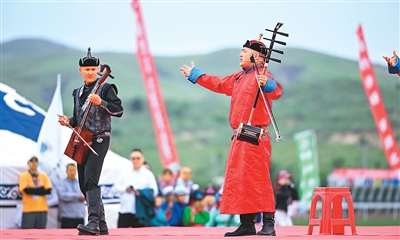




- BRNN
- BRI News
- BRNN News
- Database
Official Documents Polices and Regulations
Inter-government Documents International Cooperation BRI Countries
Business Guide Economic Data BRI Data
Trade
Investment Projects Latest projects
Cases - Content Pool
China saw a surge in sporting events in September, attracting big crowds and significantly boosting local economies.
The growing integration of sports and tourism in recent years has fueled the two industries and added momentum to local growth.
The 2025 Jiangsu Football City League, known as the Su Super League and featuring 13 city teams in east China's Jiangsu Province, illustrates this trend.

Performers take the stage during the opening ceremony of the 11th Traditional Games of Ethnic Groups of Inner Mongolia Autonomous Region at the Bairin Right Banner venue in north China's Inner Mongolia Autonomous Region. (Xinhua/Bei He)
On Sept. 6, the 11th-round match between Nanjing and Xuzhou drew a record 60,817 spectators in the provincial capital, with additional fans watching on large screens in shopping districts and neighborhoods.
For Cao Xuan, who studied in Nanjing before moving to Beijing for work, the Su Super League was the perfect reason to return. He managed to get tickets for the Sept. 6 match and used a weekend plus two days of leave for a four-day stay. In addition to the game, he visited Nanjing’s landmarks including the Fuzi (Confucius) Temple scenic area, Zijin Mountain and Xinjiekou.
Like Cao, many others traveled to Nanjing for the Su Super League. According to the city's smart tourism monitoring platform, tourist attractions, museums, cultural districts and rural sites logged 728,000 visits on Sept. 6, up 20.3 percent from the previous day.
Tourism spending in Nanjing hit 730 million yuan ($102.5 million) on Sept. 6, up 6.1 percent from a day earlier, according to China UnionPay Merchant Services. The surge was also reflected in packed hotels across key parts of the city.
To cater to fans, Nanjing rolled out a hotel brand tied to the Su Super League. Partner hotels offer themed rooms, shuttle buses and dining discounts for football travelers.
Yang Xuedong, economic director at China's General Administration of Sport, said at a recent news conference that the agency plans to deepen cooperation between sports events and tourism. Yang also highlighted the "ticket-stub economy," which provides discounts on dining, lodging and travel for those attending events.
The 2025 World Rowing Championships will take place on Sept. 21 in Qingpu district, Shanghai. Ticket holders can enjoy more than 170 perks, including discounts on shopping, dining, hotels, attractions, entertainment, and water sports.
To attract varied visitors, Qingpu has unveiled event-themed micro-vacation packages that blend daytime access to competitions with evening explorations of ancient towns and quality B&B stays. By connecting scenic sites, waterways and rural destinations, these packages spotlight the district’s full tourism potential and encourage multi-day deep-dive tours.
Anshun, in southwest China's Guizhou Province, is planning several events from late September through year-end, including the 2025 International High Bridge Extreme Sports Invitational Tournament at Baling River bridge to boost tourism.
A city official said Anshun will make sports-tourism integration a key autumn offering, merging the thrill of sports with tourism to create unique experiences for visitors and drive sustainable local growth.

Tel:86-10-65363107, 86-10-65368220, 86-10-65363106